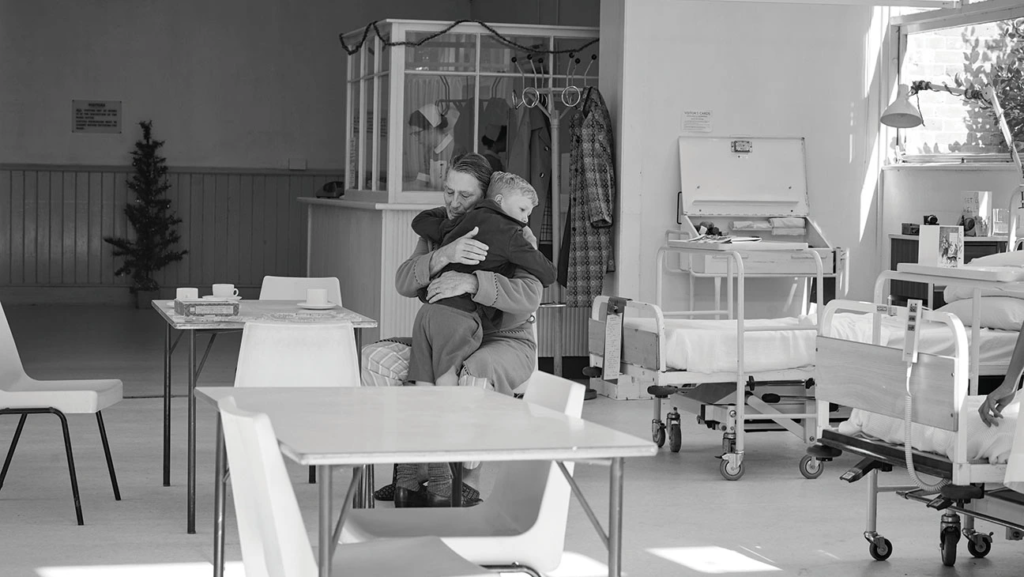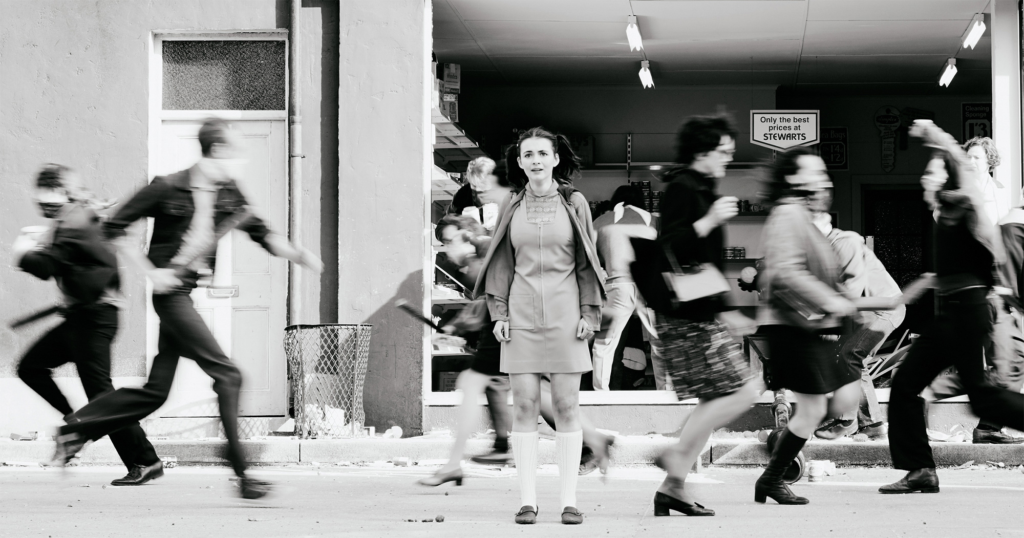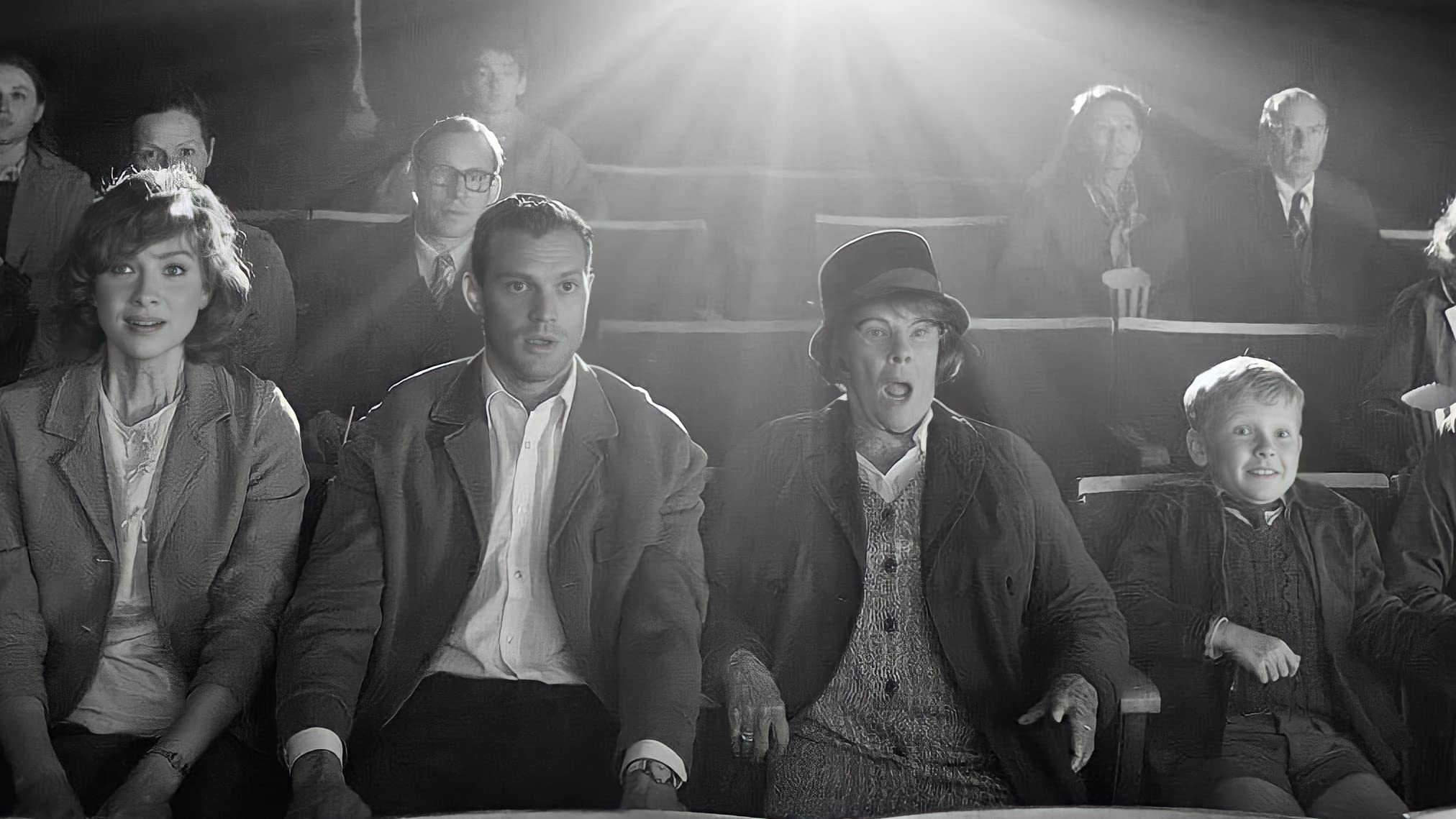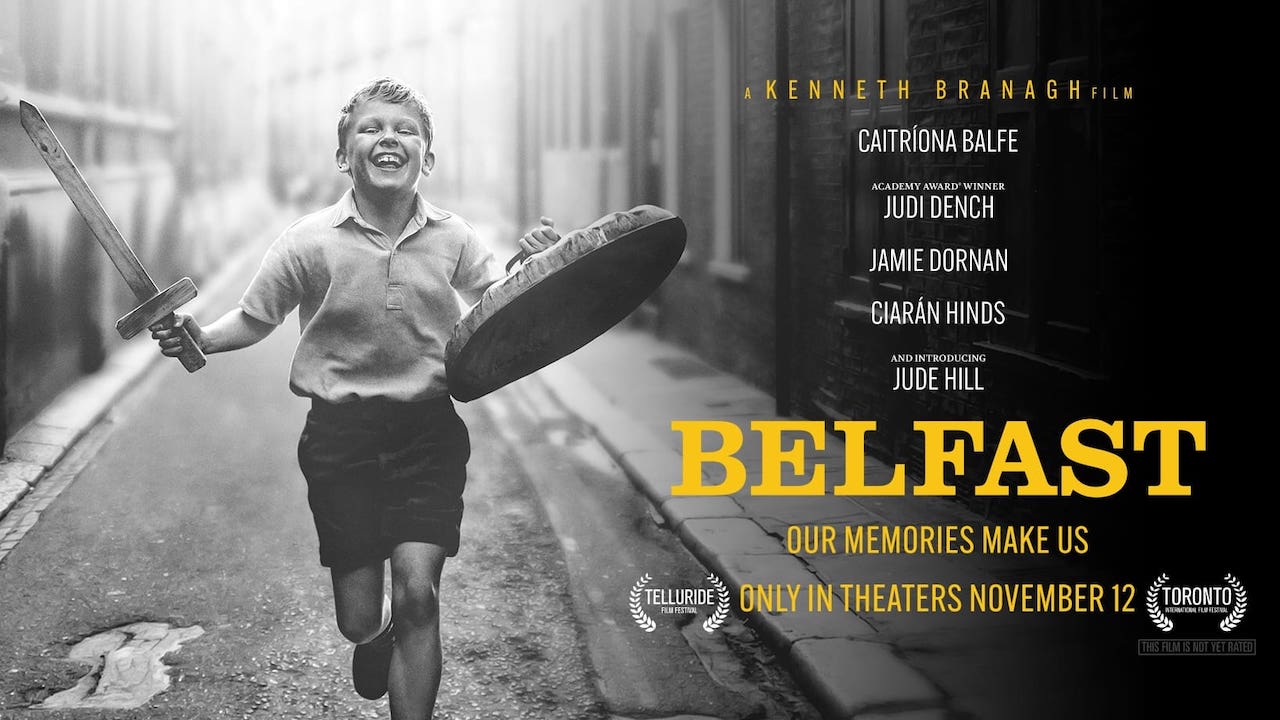Film Review Redux: Finding Family, Conscience, and Home in “Belfast”
Since a year has passed since Thought to Action published its last movie review (Brian Fiallo’s witty analysis of Arnold Schwarzenegger’s Conan the Barbarian), I thought I’d try my hand at another one. The movie: Belfast (2021), Kenneth Branagh’s semi-autobiographical story which he wrote and directed. The film won an Oscar this year for best original screenplay—its originality no doubt stemming from Branagh’s own childhood in Belfast during the Troubles—the nearly 30-year violent civil war between Catholics and Protestants in Northern Ireland. Branagh brings his story to life in the film through an easy-to-love, blue-collar family. The audience sees Belfast and the Troubles through the eyes of an eight-year-old boy, Buddy, the youngest child in the family. In this article, I’ll provide a summary of the film’s plot (which will contain spoilers, consider this your warning) and analyze it’s three broad themes:
1. The importance and strength of family
2. The value of a well-informed conscience
3. The meaning of home and identity
The Story
This coming-of-age tale opens in a happy neighborhood in Belfast, August 1969. Kids play in the street while adults supervise and visit amongst themselves. It’s an Irish Mayberry. Suddenly we (the audience) hear a young boy named Buddy being called home by his Ma for tea. As Buddy disengages from his sword fight and turns towards home, a violent mob descends upon the street with bricks, guns, Molotov cocktails, and a car bomb. Buddy’s Ma rushes into the street to swift him inside their home to safety, and they are soon joined by Buddy’s pre-teen brother Will. The boys hide under the kitchen table while Ma looks out the front window, which quickly explodes from the car bomb’s detonation.
We soon learn that the violent mob was composed of Protestants who attacked the neighborhood because it contained a mix of Protestant and Catholic families. The attack was a final warning to the Catholics to leave that neighborhood, and to their Protestant neighbors to no longer tolerate their Catholic neighbors’ presence. The mob’s leader, Billy Clanton, will remain a thorn in Buddy’s family’s side for the rest of the film. While Buddy’s family is Protestant, they respect and defend their Catholic neighbors.
We are slowly introduced to more members of Buddy’s family. His father, Pa, who “is away in England” working as a welder, returns home periodically to check on his family. Pa continuously tries to convince Ma to move the family to England where safety and a better livelihood await. Pa’s parents, Pop and Granny, live nearby and frequently entertain Buddy after school. They play a sizable role in shaping Buddy’s moral compass and understanding of the complicated world around him. Working against the grandparents’ positive influence is Buddy’s older cousin Vanessa, a pre-teen tomboy who has joined a youth gang associated with Billy Clanton’s Protestant mob. Vanessa figures as the devil on Buddy’s one shoulder, while his grandparents and a fire-and-brimstone sermon from his Protestant preacher represent the angels on his other shoulder. More on this in the second theme below.
Despite his city self-destructing around him, Buddy largely enjoys the carefree life of an eight-year-old boy. He falls in love with a classmate at school, Catherine, and studies his multiplication tables dutifully so he can advance to the front of the class and sit next to her. He loves going to the movies (especially John Wayne films), Star Trek, and following the American moon landing.

Pop’s health worsens as a result of infected lungs he developed working in English coal mines. Before his death, Pop imparts sage advice about family and Buddy’s identity in several intimate scenes at the Belfast hospital. In parallel, the violence in Belfast also worsens. Pa again urges Ma to relocate the family to England, but she fears leaving the only world she and her children have ever known.
Ma ultimately agrees to leave Belfast after the film’s climax scene, which, in my opinion, is one of the most poignant I’ve watched in a long time. The Protestant mob, led by Billy Clanton, marches towards a Catholic-owned supermarket to loot and burn it. Vanessa is among the mob and pulls Buddy into its ranks. When Buddy asks where they are headed, she discloses that they are going to raid the supermarket. Buddy exclaims that he wants to go home and tries to break from the mob, but Vanessa pulls him back in. The mob smashes the glass windows and descends upon the store, toppling shelves and chasing the middle aged female owner away. When Buddy asks Vanessa what to take, she yells “whatever you need!” Buddy hesitatingly takes a box of cereal and runs home.
Buddy, with a smile, presents the box to Ma. Furious, she grabs him by the arm and marches him back to the shop to return his stolen cereal. Ma finds Vanessa outside and similarly grabs her, bringing both children inside the shop, which is still being ransacked by Protestant gang members. Ma sternly tells both children she will whip them if they ever do anything like this again, and tells them to return their stolen items to the shelves. Billy Clanton approaches Ma and screams, “Woman! We don’t put anything back!” Ma attempts to leave with the children, but Billy grabs them, draws a handgun, and walks outside. Seeing the police and British military units drawing near, Billy uses them as a human shield and aims his gun at Pa and Will, who have just arrived at the store.

In a scene reminiscent of a John Wayne stand-off in an Old Western, Pa and Billy stare each other down while Ma, Buddy, and Vanessa hang in the balance. Quickly, Will tosses a brick to Pa, who throws it at Billy, while Ma lunges towards Billy’s weapon and knocks it from his hands. Billy is quickly subdued by the police and the family reunites. Pa shields Ma and their sons with a tight embrace. Vanessa, standing alone in front of the supermarket sobbing, runs towards her uncle, who kisses her and brings her into his protection.
The film concludes with Ma telling the family to pack their things to move to England. As their bus drives away from Belfast, the camera lingers on Granny standing at the bus stop, telling them to go and not look back.
Theme 1: The Importance and Strength of Family
This film reinforces the assertion that the family is the bedrock of society. Perhaps this is the reason why so many people return to classic, family-oriented films like The Sound of Music and Little Women so frequently (or is that just me?). There is something inherently beautiful, comforting, and safe about the love and protection afforded by the family.
In Belfast, Pa is physically absent for most of the film, but his role as the family’s protector and provider is readily apparent. The climax scene beautifully underscores his fortitude, love of his family, and willingness to stand up for justice. That Billy Clanton mocks Pa as “The Lone Ranger” in the climax scene speaks to Pa’s virtue and chivalry. And Pa’s embrace of Vanessa demonstrates forgiveness—a concept so crucial to a family’s strength and ability to persevere.
Pa gives Ma credit for raising the boys largely on her own. She looks after her sons and neighbors, manages the family finances and household, and loves Granny and Pop as her own parents. Her character perfectly complements Pa’s as the tender nurturer of the family. The family finds joy amidst their suffering—literally dancing in the streets in some scenes—and shares that joy with those around them. They remind us that we have the ability and potential to do the same in our own families and neighborhoods.
Theme 2: The Value of a Well-Informed Conscience
The film beautifully depicts the development of Buddy’s moral compass as he loses his childhood innocence and approaches the age of reason. The evil around him starkly juxtaposes the good he finds within his immediate family. Buddy comprehends these moral complexities in two ways: (1) through his dialogue with his Pa and grandparents and (2) watching American Old Western films. Buddy’s moral development contrasts with that of his older brother Will, who has already reached the age of reason and is pressured by Billy Clanton’s gang to ferry weapons, ammunition, and messages between cells in Belfast.
As an extension of the first theme, the formation of conscience begins in the home with the family. In dropping off Buddy at school one morning before returning to England, Pa implores: “Be good, son, and if you can’t be good, be careful.” A simple reminder to this eight-year-old would benefit many of us as adults: do the right thing, but if you aren’t sure what that is, exercise prudence.
Granny and Pop similarly provide guardrails for Buddy’s moral compass. Granny takes Buddy to see A Christmas Carol. Afterwards, the Ghost from Christmas Past seemingly haunts Buddy as he navigates the ethnic warfare around him. Additionally, Granny and Pop insist that Will and Buddy attend Protestant church services on Sunday. The film only depicts one Sunday attendance, but it contains a fire-and-brimstone sermon from the preacher about approaching a fork in the road. One road is straight, narrow, and sunny while the other is jagged, confusing, and dark. Later that night, Buddy sketches the fork and its diverging roads in his school notebook, returning to his drawing throughout the film as he works through his own moral dilemmas.
Aside from faith and family, Buddy conceptualizes the perennial tension between good and evil by learning from American Old Western films, specifically those featuring the iconic actor John Wayne. For Buddy, the characteristic show down on a deserted Western street between John Wayne and “the bad guy” simplifies the complex environment in Belfast. It is no coincidence that Branagh sets up the climax scene as a stand down between Pa and Billy Clanton. In Buddy’s eyes, it is necessary for a strong individual to stand up to and confront evil head-on.

Ma, Pa, Granny, and Buddy at the movies
Like many of us, while Buddy strives to do the right thing, he often falters. Despite his family and the preacher’s sermon acting as angels on one shoulder, his cousin Vanessa and the Protestant mob act as devils on his other shoulder. She initiates Buddy into the Protestant gang by forcing him to steal candy from a local shop while she distracts the owner. According to their plan, she tells Buddy to steal a particular type of chocolate bar. Buddy, however, gets nervous and is quickly caught in the act. He only manages to steal Turkish delight, narrowly escaping and outrunning the shop owner. When he and Vanessa are finally out of the owner’s reach, Buddy confesses that he only came away with Turkish delight. Vanessa exclaims that nobody even likes Turkish delight! Ashamed, Buddy admits he doesn’t like it either. As he sulks home, he tosses the candy on the ground. This scene, for me, is an all-too-friendly reminder of how often sin and temptation yield a much less rewarding outcome than we may expect or hope for when we act against our conscience. It rarely
Theme 3: The Meaning of Home and Identity
The family’s decision to leave or stay in Belfast raises the question of whether home defined is where you live, or by family presence. Ma holds that she and her children have never known anywhere else as home; they are safe, despite the violence, because all their family, friends, and neighbors know their boys and look out for them. A distressed and frantic Buddy later cites the same reasons to his parents when they first float the idea of moving to a house in England with a nice garden. Buddy cries out: “I don’t want a bloody garden! I want my Granny and Pop. I’ll have no friends and no cousins. I don’t want to leave Belfast!”
Later, in one of the last scenes between a dying Pop and Buddy, Buddy tells his grandfather that he wants him and Granny to join his family in England. Buddy also tells his grandfather that he cannot imagine leaving Belfast and going to a place where nobody will know him. Pop replies, “You’re Buddy from Belfast, where everybody knows ya and looks out for ya…no matter where you go, that’s who ya are. Will you remember that for me?”
Most military families could probably relate to these family dialogues. Moving locations every 2-3 years (sometimes more frequently) makes it difficult to consider a single place as home. Harkening to the first theme, family foundations undergird the meaning of home and each family member’s identity. Affirming that children are loved as the sons and daughters of their parents, despite whatever life brings, provides them with a sense of self and resilience.
In Closing
Perhaps because I’m an Irish-American with an old soul and love of history, I have a soft spot for tales from the isle of my ancestors. But I do believe Belfast contains universal truths and lessons for individuals and families. The suffering, and joy found within that suffering, that Buddy’s family endured evoke stories we’ve seen on the news of refugees from Syria, Afghanistan, and, most recently, Ukraine.
It is a story central to America’s history—of overcoming hardship and adversity to achieve the American dream. And it’s a reminder of our shared humanity. When thinking of the characters’ development in Belfast, these words of Saint Paul come to mind:
When I was a child, I spoke as a child, I understood as a child, I thought as a child. But, when I became a man, I put away the things of a child. We see now through a glass in a dark manner; but then face to face. Now I know in part; but then I shall know even as I am known. And now there remain faith, hope, and charity (love), these three: but the greatest of these is charity (love).
1 Corinthians 13:11-13
While many of us are fortunate to not live in violence-ridden cities like Belfast, plenty of Americans do. Recent events in Buffalo, Uvalde, and Tulsa—not to mention the record-breaking daily murders in my home city of Chicago—demonstrate that evil does exist in our world. But keeping in mind the words of Saint Paul and the themes from Belfast, charity (love), family, and well-formed consciences contain the tools to triumph over these evils, and find joy amidst suffering.
About the Author:
Brigid Calhoun is a U.S. Army Major serving as a special assistant on the Army Staff.
* The opinions expressed here are those of the author and do not represent those of the Army, the Department of Defense, or any part of the U.S. government.
